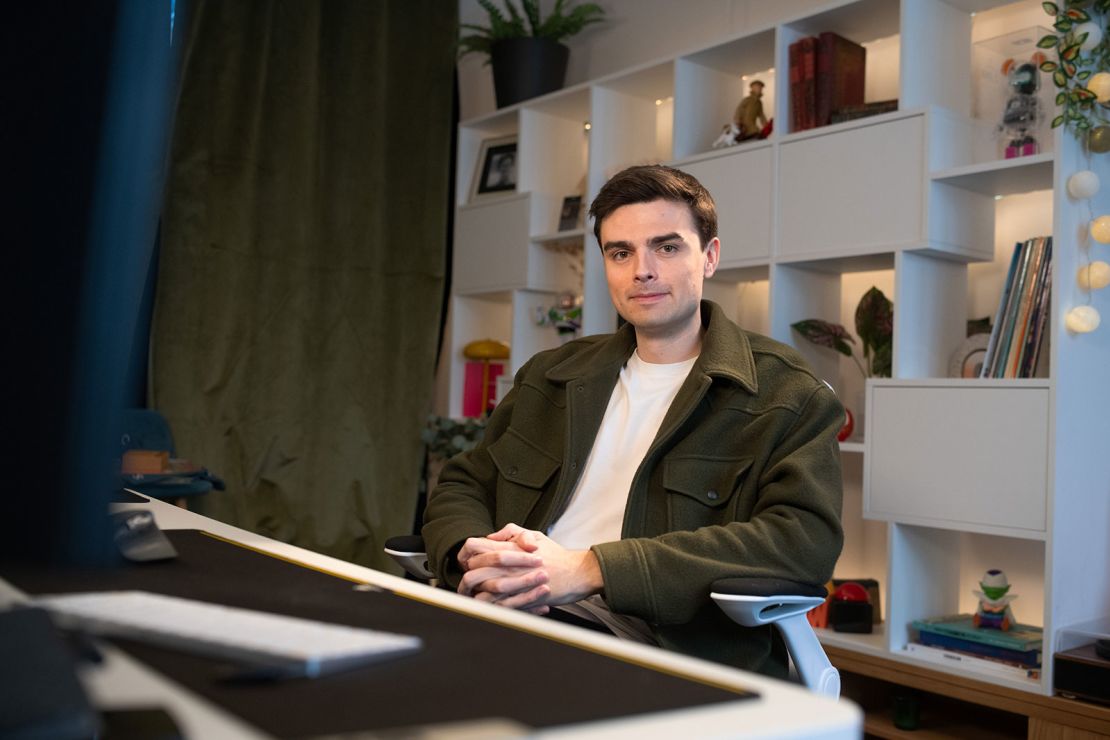Hugo Travers may not think of himself as a journalist, but he could be the most popular one in France.
Travers, 26, is the founder and face of HugoDecrypte, a French media start-up that delivers news aimed primarily at young audiences. What began eight years ago as a university student’s YouTube channel now boasts 14 million followers across its social media accounts, 200 million monthly views on TikTok and another 35 million on YouTube.
HugoDecrypte’s Instagram account has more followers than Le Monde, the French daily widely considered the country’s newspaper of record, as well as BFMTV and France24, arguably the two most popular 24-hour news networks in France. And its daily news update is the most downloaded podcast in the country, according to media monitor ACPM.
“What’s very special is the fact that I really started as a YouTuber and I consider myself really as a YouTuber,” Travers told CNN in an interview last month.
Whatever you call him, there’s no denying that Travers has created something that resonates with young audiences shunning traditional media in France, where mistrust of the news industry runs deeper than in much of the rest of Europe.
“He is seen as a very reliable source for news,” said Alice Antheaume, vice-dean at the Sciences Po Journalism School.
Given the YouTube channel’s dominance among the coveted age 15 to 34 demographic, most major politicians in France, including President Emmanuel Macron, have sat down with Travers to reach a younger audience. Travers hosted nearly all of the candidates running for president in 2022.
While Macron went on to win re-election, he has struggled to maintain support among younger voters as his agenda has become more conservative. In January, Macron appointed 34-year-old Gabriel Attal as the country’s youngest-ever prime minister and tasked him with revitalizing his government.

HugoDecrypte’s 10-minute news digest is posted weekdays on YouTube and audio platforms. It typically features the Franco-British Travers, often casually dressed, delivering explainer-style summaries from behind a desk, alongside animations or stock video.
Francois Jost, an emeritus professor at Sorbonne Nouvelle University in Paris and expert on the French media, said the channel’s “great use of images” appealed to young people.
Though the HugoDecrypte team doesn’t shy away from the biggest news of the day, it often looks to its audiences for guidance in choosing the lead story. Mental health issues are frequently the first story covered, as are conflicts less often in the media spotlight, such as those in Sudan or the Democratic Republic of Congo.
“What we’re building, since day one, is something serious in terms of news, in terms of its journalistic approach,” Travers said. “Of course, the format is different.”
A Chromebook and an idea
When Travers launched the channel eight years ago, all he had was a Chromebook without editing software.
He had gumption and experience, though. As a precocious middle school student, Travers started a website with friends, for which he covered local sports and news in the suburb he grew up in, west of Paris.
By 2015, Travers was studying at Sciences Po, a prestigious university in Paris. The idea for his YouTube channel came from two realizations.

The first concerned the state of political coverage in French media. Travers had been interested in politics for years — yet when he and his friends turned on political debates on television, they could barely understand what was being discussed, he recalled.
Travers also thought about how he consumed content: like much of Gen Z, he was spending hours on YouTube. He had go-to channels for history and science but no preferred source for journalism in French.
The HugoDecrypte channel launched with the mission to give young French audiences a fast, digestible way to understand the news. Travers’ goal was to create accessible, in-depth videos that wouldn’t pander to younger audiences nor assume too much prior knowledge. Then he’d publish them directly to social media.

“My generation spends so much time on YouTube,” he said. “You’ve got to create content where people are … If I spend time on YouTube or Instagram, why would I not get informed on YouTube or Instagram?”
Seeking growth, Travers decided to hire staffers. Benjamin Aleberteau, a recent graduate, became HugoDecrypte’s first employee in January 2019; today he’s editor-in-chief. HugoDecrypte has expanded to a team of about 25 employees working out of a modern office at the end of a cobblestone alley in the 11th arrondissement of Paris. Their newsroom reflects their target audience — there’s a video game console in the kitchen, a dog roams the halls and everyone appears to be in their 20s.
Beyond the world of politics, Travers’ in-depth interviews have also become a valued stop for anyone promoting a film, book or TV series to the Francophone world. He hosted Christopher Nolan over the summer to discuss then-Oscar frontrunner “Oppenheimer” and Timothee Chalamet and Zendaya ahead of the “Dune” sequel’s release. Travers has also counted Francophone celebrities like Angele, Omar Sy, Tahar Rahim and Virginie Efira among his guests.
HugoDecrypte’s success is notable considering the bleak state of the French news media landscape. Like their English-language counterparts, French news outlets face declining advertising revenue, the spread of misinformation and increasing mistrust in the media.
Many anglophone outlets have turned to subscription-based revenue models to survive. But in France, just 11% of people surveyed pay for news, according to the Reuters Institute.

Both Jost at Sorbonne Nouvelle University and Antheaume at the Sciences Po Journalism School pointed out that HugoDecrypte often hews toward explanatory journalism, content that is cheaper and quicker to create than original reporting.
Travers sees the two as complementary, saying that HugoDecrypte is looking into partnerships with traditional news or investigative outlets. Meanwhile, HugoDecrypte makes money via advertising, partnerships and sponsored content.
Travers attributes the brand’s success to the channel’s original mission: producing accessible content. That means no paywall and interacting directly with younger audiences on social media.
Building trust
To reach Gen Z, HugoDecrypte launched on TikTok earlier than most French media.
“TikTok was, at least in France, seen as this thing for teenagers … basically with dancing and challenges,” Travers said. “But it’s still a platform where there’s millions of young people, and those young people, I’m convinced that they’re interested in news and in politics.”
Trust is also a key factor. The French public has grown increasingly skeptical of newspapers and television stations owned by billionaires like Xavier Niel or Vincent Bollore, whose conservative media empire is often compared to that of Rupert Murdoch.
Travers told CNN he decided early against raising capital, a decision he believes has allowed the operation to grow at a sustainable pace.
Then there’s personification. Tying the brand to Travers’ name and likeness has, some experts say, allowed him to inspire a degree of confidence among young audiences who don’t consume traditional media.
“Audiences are more likely to trust individuals than media brands, especially on social media. HugoDecrypte fits perfectly with this need,” said Antheaume.
And, unlike many high-profile anglophone news personalities, Travers has worked hard to keep his opinions out of the public view.
HugoDecrypte has been able to capitalize on several trends in the French news industry. While the brand is starting to branch out into English- and Spanish-language content, it’s not clear if the model itself will translate successfully.
Travers acknowledges the challenges inherent in building a cross-cultural brand. But he and editor-in-chief Aleberteau believe that, wherever there is social media, their model is viable.
“In any country there’s a need for information. And in any country, there are young people who want to be informed,” Aleberteau said.








